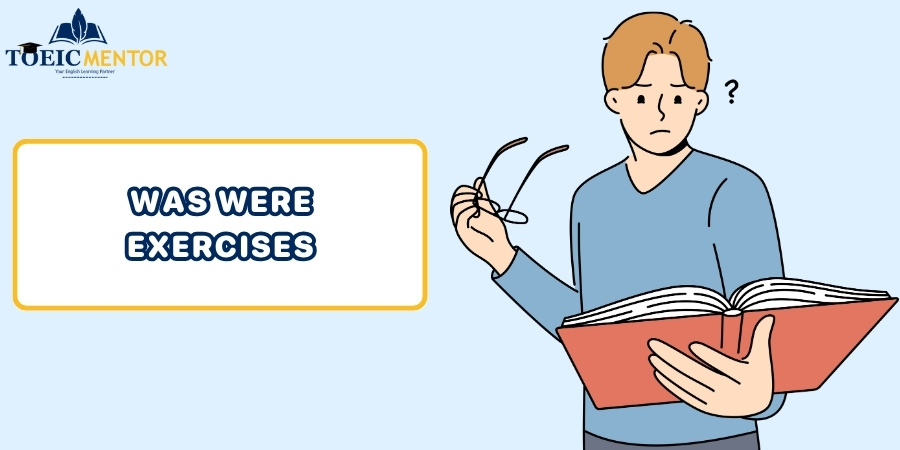การใช้ Was และ Were อาจดูเป็นเรื่องเล็กน้อย แต่การเข้าใจผิดอาจทำให้ประโยคของคุณฟังดูแปลกๆ ได้ บทความนี้จะช่วยให้คุณเข้าใจหลักการใช้ Was และ Were อย่างถูกต้อง พร้อมแบบฝึกหัด was were ที่จะทำให้คุณมั่นใจในการใช้งานจริง
I. หลักการใช้ Was, Were ที่ถูกต้อง
| ประธาน (Subject) | คำกริยาที่ใช้ | ประโยคตัวอย่าง |
| I | was | I was happy yesterday. (ฉันมีความสุขเมื่อวาน) |
| He, She, It | was | She was a student. (เธอเป็นนักเรียน) |
| ประธานเอกพจน์ | was | The cat was sleeping. (แมวกำลังนอน) |
| You | were | You were right. (คุณพูดถูก) |
| We, They | were | We were tired. (พวกเรารู้สึกเหนื่อย) |
| ประธานพหูพจน์ | were | My friends were late. (เพื่อนๆ ของฉันมาสาย) |
กฎง่ายๆ ที่ต้องจำคือ ประธานเอกพจน์ใช้ Was ส่วนประธานพหูพจน์และ You ใช้ Were เสมอ ไม่ว่า You จะหมายถึงคนเดียวหรือหลายคนก็ตาม
กฎเหล็กข้อที่ 1: ประธานเอกพจน์ (Singular Subject) ต้องใช้ “Was”
ประธานเอกพจน์ทุกตัวจะใช้ Was โดยไม่มีข้อยกเว้น ดูตัวอย่างเหล่านี้เพื่อความชัดเจน
- I was hungry this morning. (ฉันหิวเมื่อเช้านี้)
- He was my teacher last year. (เขาเป็นครูของฉันเมื่อปีที่แล้ว)
- She was very kind to everyone. (เธอใจดีกับทุกคนมาก)
- It was cold outside yesterday. (เมื่อวานข้างนอกหนาวมาก)
- The dog was barking loudly. (สุนัขเห่าเสียงดังมาก)
กฎเหล็กข้อที่ 2: ประธานพหูพจน์ (Plural Subject) และ “You” ต้องใช้ “Were”
ประธานพหูพจน์และ You ทุกกรณีจะใช้ Were เท่านั้น ไม่ว่า You จะหมายถึงบุคคลเดียวหรือหลายคนก็ตาม*
- You were absolutely correct about that. (คุณพูดถูกต้องเกี่ยวกับเรื่องนั้นจริงๆ)
- We were planning to visit you last week. (พวกเราวางแผนจะไปเยี่ยมคุณเมื่อสัปดาห์ที่แล้ว)
- They were discussing the project details. (พวกเขากำลังคุยกันเรื่องรายละเอียดโครงการ)
- My parents were watching TV together. (พ่อแม่ของฉันกำลังดูทีวีด้วยกัน)
*หมายเหตุ: You ใช้ were เสมอ ไม่ว่าจะพูดกับคนเดียวหรือหลายคน เพราะเดิมทีภาษาอังกฤษใช้ You เป็นคำสรรพนามแบบสุภาพ
II. เจาะลึกโครงสร้างการใช้ Was, Were ในประโยค 3 รูปแบบหลัก
เมื่อคุณเข้าใจหลักการพื้นฐานแล้ว มาดูวิธีใช้ Was และ Were ในประโยครูปแบบต่างๆ เพื่อให้คุณสามารถสร้างประโยคได้หลากหลายและถูกต้อง
1. ประโยคบอกเล่า (Affirmative Sentences)
โครงสร้างประโยคบอกเล่าจะเป็น Subject + was/were + complement ซึ่งเป็นรูปแบบพื้นฐานที่ใช้บ่อยที่สุดในการสื่อสาร
- I was excited about the new movie. (ฉันตื่นเต้นกับหนังเรื่องใหม่มาก)
- She was reading a book in the garden. (เธอกำลังอ่านหนังสือในสวน)
- They were happy with their test results. (พวกเขาพอใจกับผลสอบของตัวเอง)
2. ประโยคปฏิเสธ (Negative Sentences)
ประโยคปฏิเสธใช้โครงสร้าง Subject + wasn’t/weren’t + complement โดย wasn’t เป็นรูปย่อของ was not และ weren’t เป็นรูปย่อของ were not
- He wasn’t interested in the conversation at all. (เขาไม่สนใจการสนทนานั้นเลย)
- We weren’t ready for the exam yesterday. (เมื่อวานพวกเราไม่พร้อมสำหรับการสอบ)
- The weather wasn’t suitable for outdoor activities. (สภาพอากาศไม่เหมาะสำหรับกิจกรรมกลางแจ้ง)
3. ประโยคคำถาม (Interrogative Sentences)
ประโยคคำถามใช้โครงสร้าง Was/Were + Subject + complement? และการตอบจะใช้ Yes/No ตามด้วย was/were ที่เหมาะสม
- Were you busy last night? (คุณยุ่งเมื่อคืนนี้มั้ย?) – Yes, I was. (ใช่ครับ/ค่ะ)
- Was she your classmate in high school? (เธอเป็นเพื่อนร่วมชั้นของคุณตอนมัธยมปลายใช่มั้ย?) – No, she wasn’t. (ไม่ใช่ครับ/ค่ะ)
- Were they satisfied with the service? (พวกเขาพอใจกับบริการมั้ย?) – Yes, they were. (ใช่ครับ/ค่ะ)
บทความแนะนำอ่านต่อ:
III. แบบฝึกหัด Was Were พร้อมเฉลย (ตอบโจทย์ทุกระดับ)
ตอนนี้มาทดสอบความเข้าใจของคุณกับแบบฝึกหัด was were พร้อมเฉลยที่เราเตรียมไว้ให้ จากระดับพื้นฐานไปจนถึงระดับที่ท้าทายความสามารถ
แบบฝึกหัดชุดที่ 1 (พื้นฐาน): เติมคำ was หรือ were ในช่องว่าง
- I _____ at home yesterday evening.
- She _____ very excited about her birthday party.
- You _____ the best student in our class.
- They _____ playing football in the park.
- He _____ not feeling well this morning.
- We _____ watching a movie together last night.
- The cat _____ sleeping on the sofa.
- My friends _____ waiting for me at the restaurant.
- It _____ raining heavily when I left the house.
- You _____ absolutely right about that decision.
- The children _____ making too much noise.
- She _____ wearing a beautiful blue dress.
- I _____ thinking about calling you earlier.
- They _____ not interested in the proposal.
- The weather _____ perfect for our picnic.
แบบฝึกหัดชุดที่ 2 (กลาง): เลือกคำตอบที่ถูกต้อง
- My sister (was/were/wasn’t/weren’t) studying abroad last year.
- (Was/Were) you and your brother at the concert yesterday?
- The books (was/were/wasn’t/weren’t) on the table when I arrived.
- I (was/were/wasn’t/weren’t) not surprised by the news.
- (Was/Were/Wasn’t/Weren’t) the meeting cancelled due to bad weather?
- The students (was/were/wasn’t/weren’t) preparing for their final exams.
- You (was/were/wasn’t/weren’t) not listening to what I said.
- (Was/Were) there any problems with the computer system?
- The food at the restaurant (was/were/wasn’t/weren’t) delicious.
- We (was/were/wasn’t/weren’t) planning to visit the museum.
แบบฝึกหัดชุดที่ 3 (ท้าทาย): แก้ไขประโยคที่ผิด
- You was very helpful during the project.
- They was not satisfied with the results.
- I were confused about the instructions.
- She were the best candidate for the position.
- We was hoping to hear from you soon.
เฉลย
ชุดที่ 1 (พื้นฐาน):
- was
- was
- were
- were
- was
- were
- was
- were
- was
- were
- were
- was
- was
- were
- was
ชุดที่ 2 (กลาง):
- was
- Were
- were
- was
- Was
- were
- were
- Were
- was
- were
ชุดที่ 3 (ท้าทาย):
- You were very helpful during the project.
- They were not satisfied with the results.
- I was confused about the instructions.
- She was the best candidate for the position.
- We were hoping to hear from you soon.
IV. คำถามที่พบบ่อยเกี่ยวกับการใช้ Was, Were (Advanced FAQ)
เมื่อคุณเข้าใจหลักการพื้นฐานแล้ว เรามาดูประเด็นที่ซับซ้อนขึ้นซึ่งจะทำให้คุณใช้ Was และ Were ได้อย่างมืออาชีพ
1. Was/Were กับ Did มีความแตกต่างอย่างไร?
| ลักษณะ | Was/Were | Did |
| การใช้งาน | แสดงสถานะ (State) | แสดงการกระทำ (Action) |
| ตัวอย่าง | I was happy. (ฉันมีความสุข) | I did my homework. (ฉันทำการบ้าน) |
| ในประโยคคำถาม | Were you tired? | Did you sleep well? |
Was และ Were ใช้บอกสถานะหรือลักษณะ ส่วน Did ใช้กับการกระทำในอดีต เมื่อเข้าใจความแตกต่างนี้แล้ว คุณจะไม่สับสนในการเลือกใช้
2. คำนามประเภทใดที่ต้องระวังเป็นพิเศษ?
คำนามที่นับไม่ได้ (Uncountable nouns) จะใช้ was เสมอ เช่น water, money, information เพราะถือเป็นเอกพจน์ คำนามหมู่ (Collective nouns) เช่น family, team, class ในภาษาอังกฤษอเมริกันจะใช้ was แต่ในภาษาอังกฤษอังกฤษอาจใช้ were ได้
- The information was very useful. (ข้อมูลนั้นมีประโยชน์มาก)
- My family was planning a vacation. (ครอบครัวของฉันกำลังวางแผนไปเที่ยว)
3. Subjunctive Mood คืออะไรและเกี่ยวข้องกับ Were อย่างไร?
Subjunctive Mood คือไวยากรณ์สำหรับเรื่องสมมติหรือความปรารถนา วลีที่เราใช้บ่อยคือ “If I were you” (ถ้าฉันเป็นคุณ) ซึ่งใช้ were กับ I เพราะเป็นเรื่องสมมติ ไม่ใช่ความจริง
- If I were rich, I would travel around the world. (ถ้าฉันรวย ฉันจะเดินทางรอบโลก)
- I wish I were taller. (ฉันอยากสูงกว่านี้)
4. การใช้ “there was” กับ “there were” ทำอย่างไรให้ถูกต้อง?
ใช่ เราสามารถใช้ there was และ there were ได้ โดยดูจากคำนามที่ตามมา ถ้าเป็นเอกพจน์ใช้ there was ถ้าเป็นพหูพจน์ใช้ there were
- There was a beautiful garden behind the house. (มีสวนสวยหลังบ้าน)
- There were many students in the classroom. (มีนักเรียนหลายคนในห้องเรียน)
- There was some milk in the refrigerator. (มีนมอยู่ในตู้เย็น)
การเรียนรู้การใช้ Was และ Were ไม่ใช่เรื่องยากถ้าคุณจำกฎง่ายๆ ไว้ ประธานเอกพจน์ใช้ Was ประธานพหูพจน์และ You ใช้ Were การฝึกฝนจากแบบฝึกหัด was were ในบทความนี้จะช่วยเปลี่ยนความสับสนให้กลายเป็นความมั่นใจในการใช้งานจริง
ความเข้าใจที่ถูกต้องเกี่ยวกับ Was และ Were จะเป็นรากฐานสำคัญสำหรับการเรียนรู้ไวยากรณ์อื่นๆ ที่ซับซ้อนมากขึ้น เมื่อคุณมั่นใจในเรื่องนี้แล้ว การเรียนรู้ Past Continuous Tense หรือ Past Perfect Tense จะง่ายขึ้นมาก

